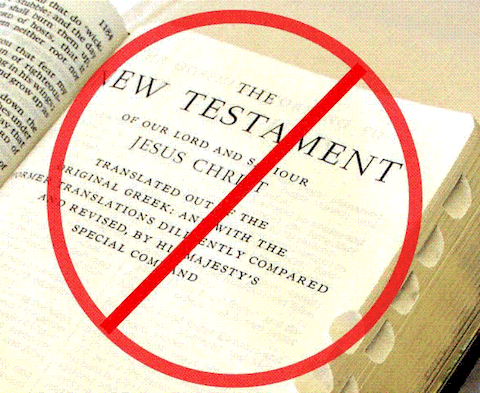
1001 Errors in the Christian Bible
Home
Dedication
Matthew
Mark
Luke
John
Acts
Contact Us
John -- Errors 479-485
#479
The fourth Gospel listed in Christian Bibles, John, was written anonymously.
The title
"John" was added by the Church long after the Gospel was written.
# 480
John 1: (KJV)
1 “In the beginning was the Word, and the Word was with God, and
the Word was God.”
More definite article games. “and the Word was with God” has
a “the” before God indicating a god in a class by himself, God
the father. In fact “the” normally precedes “god”
in the Christian Bible when god the father is being referred to and is
translated as “god the father”. I didn’t see a single English
translation that had a “the” here. Obviously the Christians
want to give a Trinitarian mistranslation here and avoid having the father
in a class by himself. Apparently they took the “the” here and
put it in the infancy narratives where it didn’t belong.
# 481
John 1: (KJV)
1 “In the beginning was the Word, and the Word was with God, and
the Word was God.”
“the Word was God.” is a related mistranslation to the above.
Biblical Greek had no indefinite article “a” so “the Word
was God.” could also be “the Word was a god.” The indefinite
article is determined by context. As THE God preceded grammatically the
Word must be A god, different from THE God.
# 482
John 1: (KJV)
1 “In the beginning was the Word, and the Word was with God, and
the Word was God.”
As we have seen, a better translation for the ending is “the Word
was a god.” The question is how is the author using “God/god”
here, as a title or as an adjective? If as a title, then “God”
could be capitalized. If as an adjective (divine) then “god”
should not be capitalized. There is a Greek word for “divine”
(adjective) which the author does not use here but the author never uses
this word in the entire Gospel. Later in this Gospel there are several
instances, such as John 10:33, where the context indicates that the author
is likely using “god” as an adjective rather than a title, so
it would appear that the adjective “divine” was not in the author’s
vocabulary and that “God/god” should be translated as either
title or adjective based on context. Based on the context here, the word
could be a title (God) or adjective (divine) but every Christian translation
I’ve seen uses the title “God” with no discussion.
# 483
John 1: (KJV)
2 “The same was in the beginning with God.”
In case you missed it the first time, the underlying Greek has a “the”
before “God” here to distinguish the Word, which is A god from
THE God. Every Christian translation I’ve seen ignores the “the”
here with no discussion.
# 484
John 1: (KJV)
3 “All things were made by him; and without him was not any thing
made that was made.
4 In him was life; and the life was the light of men.”
Keep in mind that the original had no verse divisions. The end of verse
3 is redundant, “was not any thing made that was made.”, puts
the entire verse out of balance, “All things were made by him; and
without him was not any thing made that was made.” and in Greek is
grammatically a poor translation. Combine the end of verse 3 with the
start of verse 4, “That which was made in him was life”, and
you avoid all of these problems. This was the understanding of the earliest
Church Fathers who commented. Later Church Fathers, dealing with the Arian
controversy, felt that this translation supported Arianism by showing
that life was made in the Word (Jesus) and chose the inferior translation
used by the KJV to hide the potential problem. Every modern Christian
Bible I saw has the translation the KJV uses.
# 485
John 1: (KJV)
14 “And the Word was made flesh, and dwelt among us, (and we beheld
his glory, the glory as of the only begotten of the Father,) full of grace
and truth.”
“as of the only begotten of the Father” is literally “as
of an only begotten of a Father”. Only Darby and Young translate
it literally (God bless them). A literal translation (without the definite
article “the”) gives a more figurative description of Jesus
being the God’s son.